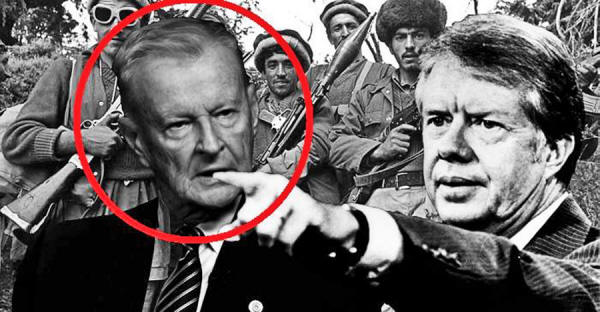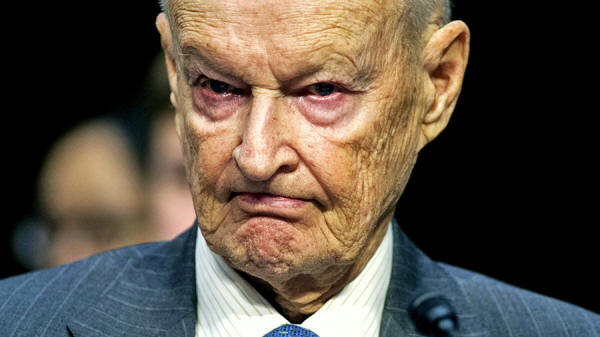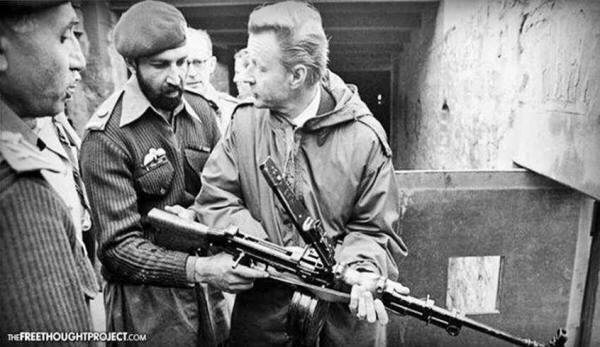|
May 27,
2017
Zbigniew Brzezinski, former national security advisor to President Jimmy Carter, died Friday at a hospital in Virginia at the age of 89.
Though the New York Times acknowledged that the former government advisor was a "hawkish strategic theorist," misrepresenting his legacy as one of otherwise infinite positivity may not be as easy as the establishment might like to think.
As the United Kingdom plays around with levels of the so-called "terror threat" following a devastating attack by an ISIS-inspired individual - and as the Philippines goes into an almost complete state of martial law following ISIS-inspired destruction - Brzezinski's timely death serves as a reminder to seek a deeper understanding of where modern terrorism originated in the first place.
As the New York Times explains, Brzezinski's "rigid hatred of the Soviet Union" guided much of America's foreign policy "for better or worse."
From the Times:
While it is progressive of the New York Times to note Brzezinski's support for Islamic militants, downplaying the effect of his vindictive foreign policy agenda with a mere sentence does an injustice to the true horror behind Brzezinski's policies.
Because a 1973 coup in Afghanistan had installed a new secular government that was leaning towards the Soviets, the U.S. endeavored to undermine this new government by organizing multiple coup attempts through America's lackey states, Pakistan and Iran (the latter was under the control of the U.S.-backed Shah at the time.)
In July 1979, Brzezinski officially authorized aid to the mujahidin rebels in Afghanistan to be delivered through the CIA's program "Operation Cyclone."
Many people defend America's decision to arm the mujahidin in Afghanistan because they believe it was necessary to defend the country and the wider region from Soviet aggression.
However, Brzesinski's own statements directly contradict this rationale.
In a 1998 interview, Brzezinski admitted that in conducting this operation, the Carter administration had "knowingly increased the probability" that the Soviets would intervene militarily (suggesting they began arming the Islamist factions before the Soviets invaded, making the rationale redundant since there was no invasion Afghanistan freedom fighters needed to repel at the time).
Brzezinski then stated:
This statement went further than merely boasting at the instigation of war and the ultimate collapse of the Soviet Union.
In his memoir, entitled "From the Shadows," Robert Gates - former CIA director under Ronald Reagan and George H.W. Bush and secretary of defense under both George W. Bush and Barack Obama - directly confirmed this covert operation began six months prior to the Soviet invasion with the actual intention of luring the Soviets into a Vietnam-style quagmire.
Brzezinski knew exactly what he was doing.
The Soviets were then bogged down in Afghanistan for approximately ten years, fighting an endless supply of American-supplied weapons and trained fighters. At the time, the media even went so far as to laud Osama bin Laden - one of the most influential figures in Brzezinski's covert operation.
We all know how that story ended.
Even with full knowledge of what his CIA-funded creation had become, in 1998 Brzezinski stated the following to his interviewers:
The interviewer at the time, refusing to allow this answer to pass, retorted:
Brzezinski dismissed this statement outright, replying:
This occurred back when the journalists asked government officials pressing questions, a rare occurrence today.
Brzezinski's support for these radical elements led directly to the formation of al-Qaeda, which literally translates to "the base," as it was the base in which to launch the repulsion of the anticipated Soviet invasion.
It also led to the creation of the Taliban, a deadly entity currently deadlocked in an endless battle with NATO forces.
Further, despite Brzezinski's statements, which attempt to depict a lasting defeat of the Russian empire, the truth is that for Brzezinski, the cold war never ended.
Though he was a critic of the 2003 invasion of Iraq, Brzezinski's stranglehold over American foreign policy continued right up until his death.
It is no coincidence that in Syria, the Obama administration deployed an Afghanistan-quagmire-type strategy toward another Russian ally - Assad in Syria.
A cable leaked by Wikileaks dated December 2006, authored by William Roebuck, who was chargé d'affaires at the US embassy in Damascus at the time, stated:
Much like Operation Cyclone, under Barack Obama, the CIA was spending approximately $1 billion a year training Syrian rebels (to engage in terrorist tactics, nonetheless).
The majority of these rebels share ISIS' core ideology and have the express aim of establishing Sharia law in Syria.
Just like in Afghanistan, the Syrian war formally drew in Russia in 2015, and Brzezinski's legacy was kept alive through Obama's direct warning to Russia's Vladimir Putin that he was leading Russia into another Afghanistan-style quagmire.
So where might Obama have gotten this Brzezinski-authored playbook from, plunging Syria further into a horrifying six-year-long war that has, again, drawn in a major nuclear power in a conflict rife with war crimes and crimes against humanity?
The answer:
According to Obama, Brzezinski is a personal mentor of his, an "outstanding friend" from whom he has learned immensely.
In light of this knowledge,
On February 7, 2014, the BBC published a transcript of a bugged phone conversation between Assistant Secretary of State Victoria Nuland and the U.S. Ambassador to Ukraine, Geoffrey Pyatt.
In that phone call, the representatives were discussing who they wanted to place in the Ukrainian government following a coup that ousted Russian-aligned president Viktor Yanukovych.
Lo and behold, Brzezinski himself advocated taking over Ukraine in his 1998 book, The Grand Chessboard, stating Ukraine was,
Brzezinski warned against allowing Russia to control Ukraine because,
Following Obama, Donald Trump came into office with a completely different mentality, willing to work with Russia and the Syrian government in combating ISIS.
Unsurprisingly, Brzezinski did not support Trump's bid for the presidency and believed Trump's foreign policy ideas lacked coherence.
All that being said, just last year Brzezinski appeared to have changed his stance on global affairs and instead began to advocate a "global realignment" - a redistribution of global power - in light of the fact that the U.S. is no longer the global imperial power it once was.
However, he still seemed to indicate that without America's global leadership role, the result would be "global chaos," so it seemed unlikely his change in perception was rooted in any actual meaningful change on the geopolitical chessboard.
Further, the CIA's very existence relies on the idea of a Russian threat, as has been evidenced by the agency's complete assault on the Trump administration whenever it appears détente is possible with the former Soviet Union.
Brzezinski died safely in a hospital bed, unlike the millions of displaced and murdered civilians who were pawns in Brzezinski's twisted, geopolitical chess games of blood and lunacy.
His legacy is one of,
-
The Man Who Trained Osama Bin Laden in Warfare
- from TheFreeThoughtProject Website
Zbigniew Brzezinski, one of the most influential US political thinkers at the height of the Cold War, has died aged 89, according to his daughter.
The advocate of US hegemony, Brzezinski, authored numerous proposals to bring down the Soviet Union.
There was no word of the cause of death.
Arming the Mujahideen in Afghanistan to bleed the Soviets, transforming Iran into an anti-Western republic, and the brokering of the Camp David Accords - are among the best known outcomes of his strategies.
Brzezinski inadvertently helped create Al-Qaeda, when he convinced President Carter that running a secret CIA program to launch a proxy-war against the USSR-backed Afghan government was going to,
Less than four years later, those "agitated Moslems" would destroy the World Trade Center and damage the Pentagon, setting off the endless "war on terror" that continues to this day.
Brzezinski was born in Warsaw, Poland, in 1928, according to official biography.
Other sources speculate that he was actually born in a Polish Consulate in the Ukrainian town of Kharkov, which at the time was part of the USSR, but his parents registered him as having been born in Poland and not the Soviet Union.
He graduated from Harvard with a PhD in political science with a thesis on the formation of a totalitarian system in the USSR - and became author of a global strategy on anti-Communism and the concept of a new form of American hegemony.
However, in one of his latest articles in the 'American Interest' journal the Polish-born diplomat asserted the US is,
In the sixties, he served as an advisor to the Kennedy and Johnson administrations and his tough stance towards the Soviet Union never waned.
In the Carter years, Brzezinski became National Security advisor and was considered the president's right-hand man. During the Clinton administration, the hawkish statesman was the main voice pushing for NATO's eastward expansion.
|




